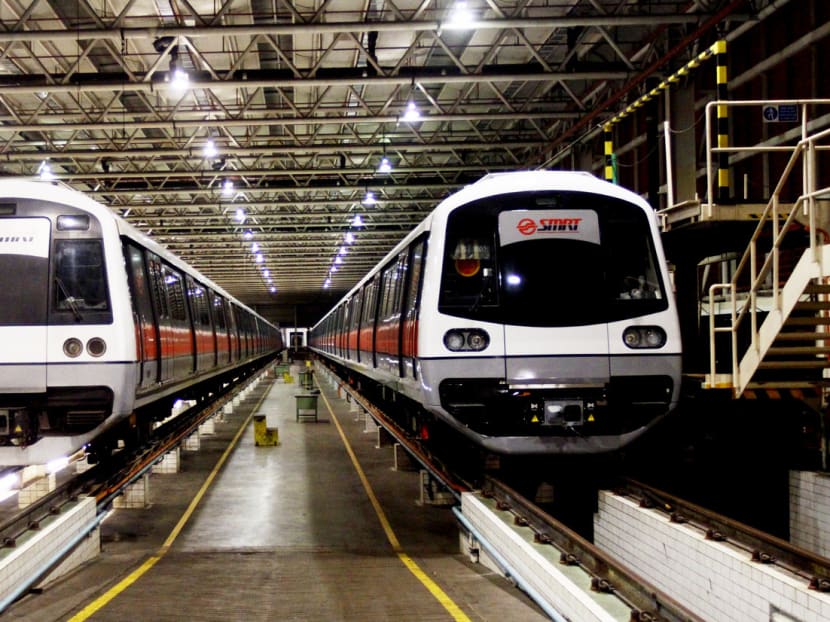Rail academy to be set up to enhance, develop industry workforce
SINGAPORE — As part of efforts to achieve a “quantum leap” in the manpower numbers and capabilities of the rail industry, the Land Transport Authority will set up the Singapore Rail Academy by the second half of the year to work with rail operators and institutes of higher learning.
SINGAPORE — As part of efforts to achieve a “quantum leap” in the manpower numbers and capabilities of the rail industry, the Land Transport Authority will set up the Singapore Rail Academy by the second half of the year to work with rail operators and institutes of higher learning.
The industry continues to be dogged by reliability issues, and Transport Minister Khaw Boon Wan said yesterday that the academy will provide training, accreditation and certification of training programmes and competencies. This will help raise existing maintenance standards and enable the industry to cope with a rapidly expanding network.
Speaking during the Ministry of Transport’s Committee of Supply debate, Mr Khaw also took pains to point out that the MRT network’s reliability has improved significantly in recent years. While there is still room “to catch up with Hong Kong”, data gathered so far this year has provided optimism, Mr Khaw said.
For example, the Downtown Line has crossed 172 days of continuous service without any major disruption.
“This is not a trivial achievement. The other MRT lines are working hard to catch up,” Mr Khaw said. The North-South Line (NSL), which Mr Khaw noted was Singapore’s oldest MRT line at nearly 30 years old, has crossed the 94-day mark.
“If there is no incident over the next (few) days, NSL will cross the 100 days’ mark next week. If they succeed, their success will especially inspiring for our team, given its age,” added Mr Khaw, who visits the maintenance staff when a line crosses or misses a significant milestone.
The North-East Line almost crossed the 100-day mark. It experienced a disruption two months ago, on the day when it was about to achieve the milestone. Yesterday marked the 69th consecutive day without any disruption on the North-East Line.
To improve rail reliability, which is an issue that has plagued the MRT network for several years, several initiatives are in the works. Among other things, rail operators SMRT and SBS Transit are ramping up their engineering and maintenance resources. Infrastructure is also being aggressively renewed.
In terms of “reskilling and upskilling” engineering and maintenance crew, the Singapore Rail Academy will hasten the process. Professor Cham Tao Soon, the former president of Nanyang Technological University and chairman of SIM University, will lead the setting up of the academy.
“He and Mr Tan Gee Paw have been a valuable help to us. They know engineering and they are risking their reputation built up over decades of excellent work in the Civil Service. They are doing national service for the larger good,” said Mr Khaw.
Mr Tan, who chairs national water agency PUB, was earlier appointed in October last year as an adviser to Mr Khaw on rail transformation.
The rail industry employs more than 6,000 workers for rail operations and maintenance; more than half are engineers and technicians. The Government aims to double the rail network to 360km by 2030. To support the expansion, it is estimated that 5,000 more workers will be needed.
Stressing that the reliability of the rail network has improved, Mr Khaw cited a globally-used measure known as the mean kilometre before failure. Last year, MRT trains here travelled an average 133,000 train-km between delays of more than five minutes. This figure has improved from the 93,000 train-km in 2014. But it still falls short of Hong Kong Mass Transit Railway’s 300,000 train-km before a delay.
“We want to catch up with Hong Kong, and we will. We target 200,000 train-km this year,” said Mr Khaw. There were 14 disruptions that lasted more than 30 minutes last year, more than the 12 occasions in Hong Kong.
At the start of his speech, Mr Khaw expressed his condolences to the families of the two SMRT staff — Muhammad Asyraf Ahmad Buhari, 24, and Nasrulhudin Najumudin, 26 — who were killed by a train last month. “The tragedy was a massive blow to all of us,” he said.
Mr Khaw noted that SMRT has completed its internal investigation and the findings are being reviewed by independent experts. “Our priorities are to establish the cause of the incident, and prevent a recurrence,” said Mr Khaw. “The investigations will ascertain whether the problem was inadequate safety procedures, or if there were human lapses in the execution of such procedures.”







